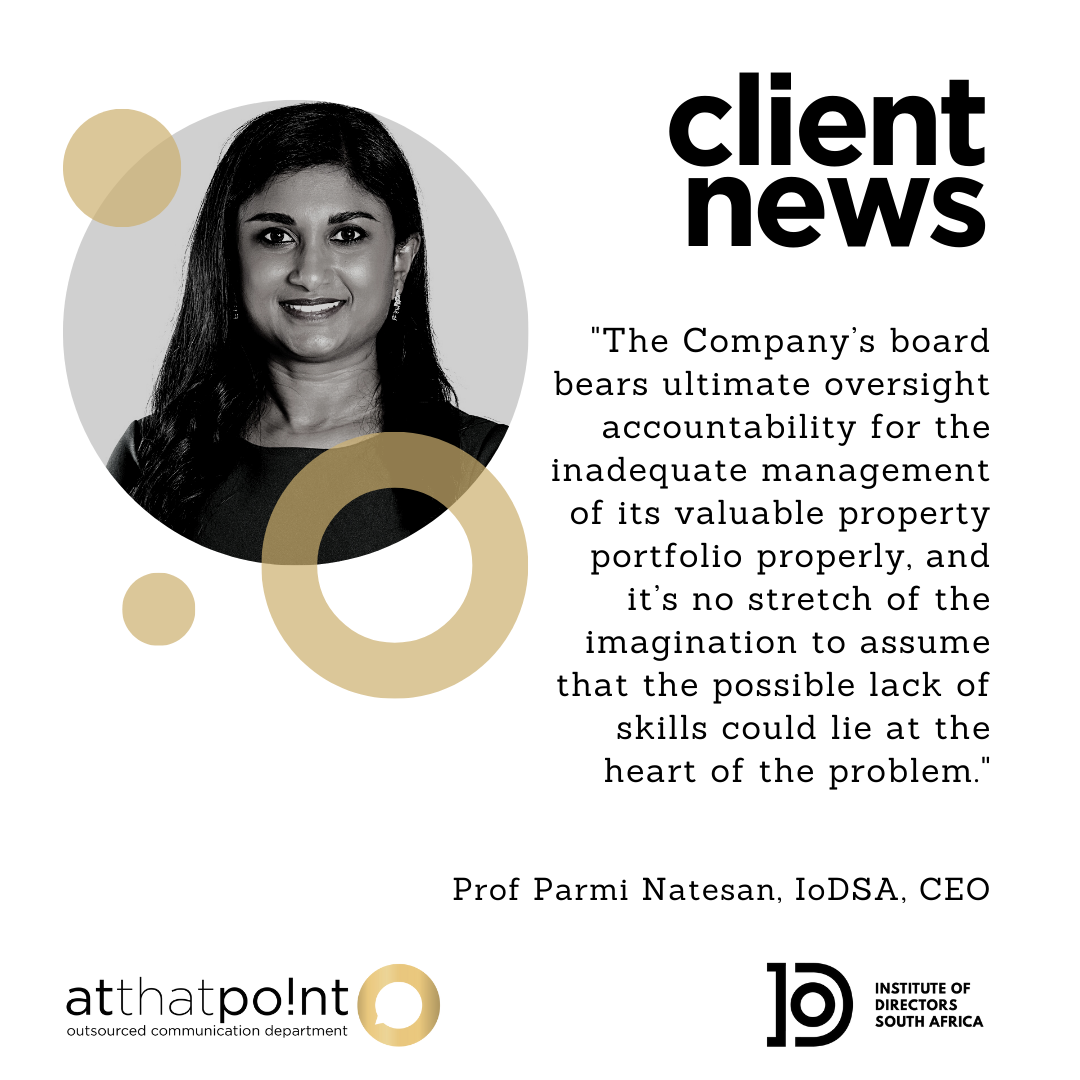 A slew of recent media reports indicate that the Johannesburg Property Company has appointed several individuals to its board who, on the face of it, do not possess the necessary skills to govern a significant municipal entity with a property portfolio worth an estimated R8.7 billion. These appointments, which are reported to include a receptionist, a cashier and a person without matric, appear to have been made unilaterally by the MMC for Economic Development. “The Johannesburg Property Company manages 30 000 properties, many of which have reportedly been hijacked—in fact, the devastating Albert Street fire that claimed 77 lives was apparently one of them. The Company’s board bears ultimate oversight accountability for the inadequate management of its valuable property portfolio properly, and it’s no stretch of the imagination to assume that the possible lack of skills could lie at the heart of the problem,” says Professor Parmi Natesan, CEO of the Institute of Directors in South Africa (IoDSA). “Media reports also suggest that the MMC treats the company as a private fiefdom to which political cadres are appointed, based presumably on their loyalty and political importance, and not necessarily their skills as directors. The sad state of municipal entities across the city, and indeed the country, shows the devastating consequences of flouting robust nomination processes for board and senior executive positions.” The IoDSA has repeatedly pointed out that public sector entities face particular challenges when it comes to appointing competent boards. The state, as the sole shareholder, has not been seen to follow best practice in this regard. According to King IV, directors should have the correct mix of skills and experience to discharge their legal duties. A robust and transparent nomination process that includes in-depth vetting of candidates should be followed, says Professor Natesan. “Without such a nomination process, the board members can hardly act competently and independently in order to fulfil their legal duties, which are to the company and not to whoever appointed them,” Professor Natesan says. “I wonder if these directors realise that they can be held personally liable for any untoward decisions they make. Modern-day directors need not only business and sector skills and experience, but also finely honed governance expertise.” The performance of local government generally, including municipal entities like the Johannesburg Property Company, has a direct bearing on service delivery and thus on the most vulnerable sectors of society. The Auditor-General’s Consolidated General Report on Local Government Audit Outcomes 2021-22, an annual report on audit outcomes for entities governed by the Municipal Finance Management Act, notes that fruitless and wasteful expenditure continues to balloon. It doubled in 2021-22 to R4.74 billion, plus an estimated R5.19 billion in financial loss from non-compliance and fraud. It is clearly imperative that municipalities and municipal entities are properly governed, and the Auditor-General highlights the need for competent people to be appointed to municipal structures, and for governance to be strengthened. “The Johannesburg Property Company is just one of many municipal entities that are perceived to be – and often are – underperforming, with one of the reasons for that underperformance reasonably assumed to be that board appointments are not necessarily made with the entity’s needs in mind,” she argues. “These entities need proper governance and strong oversight or they are likely to fail to do their jobs, with disastrous consequences for society and our country.” ENDS MEDIA CONTACT: Idéle Prinsloo, [email protected], 082 573 9219, www.atthatpoint.co.za For more information on the IoDSA please visit: Website: www.iodsa.co.za Twitter: @The_IoDSA LinkedIn: Institute of Directors in South Africa Company Page Facebook: Institute of Directors South Africa
0 Comments
Leave a Reply. |
Archives
July 2024
Categories
All
|

 RSS Feed
RSS Feed